Snake Bites (Part 1): Nonvenomous Bites
As I've said over and over here on steemit, the majority of the world's snakes are not aggressive; though some may pose a potential danger to humans, they don't actively seek out conflict. Like any animal, including ourselves, snakes will defend themselves when they feel threatened, and their defensive response varies a little bit from species to species. With no limbs, claws, spines, stingers, etc, snakes are largely left with one simple defensive strategy: their bite. Some snakes have bites that are relatively harmless, while other species have incorporated powerful toxins capable of killing with only a drop of venom!
Fortunately, snakes prefer not to use their bite as a weapon, instead choosing to flee from conflict when they can. Even venomous snakes are reluctant to use their venom when defending themselves, instead they may issue warnings like rattling their tails or displaying the interior of their mouths; this is usually enough to deter attackers. There is an important biological reason for why they are often so docile: venom is necessary for these snakes to capture their food, and if they use it on a predator (or human), they have to produce more before they can hunt again(and producing venom requires a lot of energy!). For these reasons, snake bites really only occur when the snakes have no other choice, such as when they have been cornered or captured (in the US, most bites occur only when people try to capture or kill snakes...generally young men under the influence of alcohol!). By and large, snakes are incredibly beneficial animals that make great neighbors!
Even when all the appropriate actions are taken, things can, and occasionally do, go wrong. Snake bites do happen and people are sometimes hurt even when they were not doing anything irresponsible or incorrect; accidents happen. Perhaps someone moved a rock and startled the snake hiding beneath it, or they accidentally cornered a fleeing snake they did not see. Whatever the reason, the snake may opt to defend itself by biting. Today, I want to talk a little about snake bites (this post will focus on bites from NONvenomous snakes), and what to do when such an encounter occurs.
Let's say that you were outside gardening (a little late in the season, I know); while digging, you accidentally unearthed and startled a small small snake that struck and bit you. What do you do now?
Don't panic and back up:
You don't know what kind of snake bit you yet, but the first thing to do is just get yourself out of harm's way. Calmly back away from the animal and move to a safe distance. The snake, being just as afraid of you, will probably flee as soon as you begin moving away. Move with smooth, deliberate motions; jerking or jumping away could startle the snake or seem like an attack. Do not attempt to capture or kill the snake, doing so will only put you further at risk. You will want to keep yourself calm; in the event that it is a venomous species, an increased heart rate can move the venom through the bloodstream more quickly (people who allow themselves to panic often act less rationally as well).
The vast majority of bites are quick strikes and the snake immediately lets go; in fact the bite is over before you really process what is happening. People ask me if bites from nonvenomous species hurt and (having had plenty of experience) the answer is generally no. If you've been bitten by a cat or dog, you know how painful the teeth of mammals can be and the damage they can inflict. This is because these teeth are designed for tearing meat and chewing to assist in digestion. Snakes don't chew or tear their food, they swallow it whole. They possess hundreds of teeny tiny sharp teeth that are just for gripping their prey. Being bitten by a snake sort of feels like pricking yourself on small briars, or someone lightly grasping you with velcro (it's a bizarre sensation that feels kinda grippy and prickly!). By far the worst part of a snake bite is not the pain, but the panic! There's a moment of "Oh sh*t! I got bit by a snake!", but as long as you can calm yourself, you'll be absolutely fine.
NOM!
Try to identify the snake:
If you can, try to identify the species of snake (or even try to get a picture if you are able!). First and foremost, you want to be sure that whatever just bit you was not a venomous species. Here in Virginia, there are even a few traits you can look at to know whether or not you are in any danger; a wide triangle head, vertical pupils, and a thick body often (but not always!) suggest the work of a venomous species. If the snake is long and slender with a rounded head, then it is most likely a harmless, non-venomous species.
Let's say that as you're moving away from the snake, you fail to get a good look at it. It's understandable; between the shock of the bite and wanting to retreat, you may not think to get a better look at the snake (or it immediately darted away!). Instead, focus your attention on the wound. For many snakes, the difference between venomous and nonvenomous species can be determined by the bite itself. Venomous pit vipers will leave two large holes where their large fangs injected their venom. Nonvenomous species will leave a number of tiny pin-pricks from their many gripping teeth. In any event, if you are not completely, 100% sure, call for help!
Clean the wound:
Good news! The bite is from a nonvenomous species! Since there is no venom in the wound, you can rest easy; from here on, we're gonna treat the wound like any other cut or scrape. Immediately wash the bite thoroughly with soap and water. Snakes can have some nasty bacteria in their mouths that can lead to possible infections. I've had guests claim to be bitten by venomous species because their bites itched for days...in reality, they did not wash the bite and were just exhibiting a mild infection. It's nothing potentially life-threatening, but for a quick, easy recovery, always be sure to clean up! Most bites aren't even visible the following day and there are virtually no after-affects to be concerned about.
There may be a little blood, but this is about as bad as these bites look!
With the bite cleaned up, you can go right back to gardening. More than likely, the encounter will not happen again; it was probably a freak occurrence (a wrong-place, wrong-time kinda deal). Just try to be mindful know the snake is around (though it is probably doing its best to stay well clear of you!) and do what you can to keep you and the snake safe. Now that you know the little guy is harmless, you know that you have a very beneficial animal living in your yard...even if you have to be a little more careful with your hands!
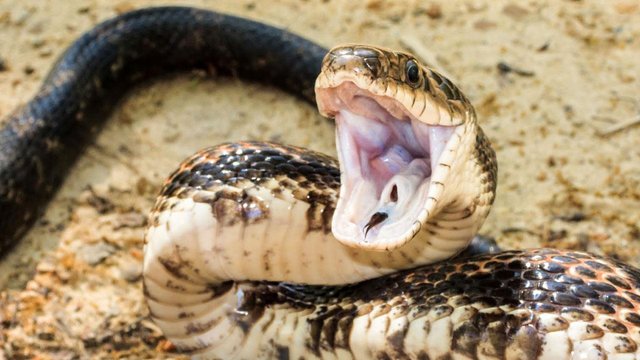
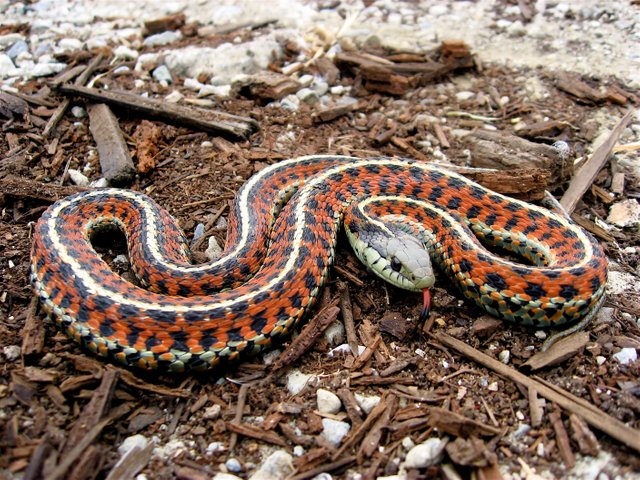
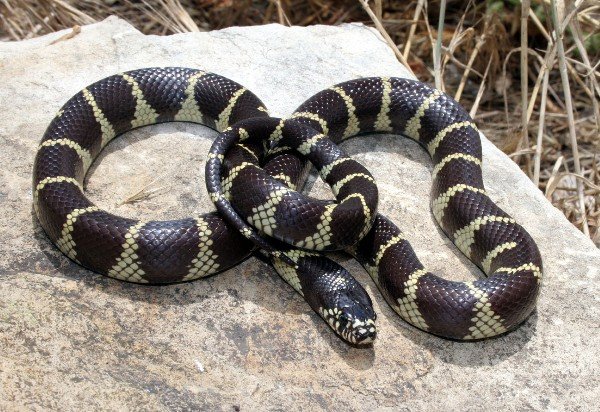
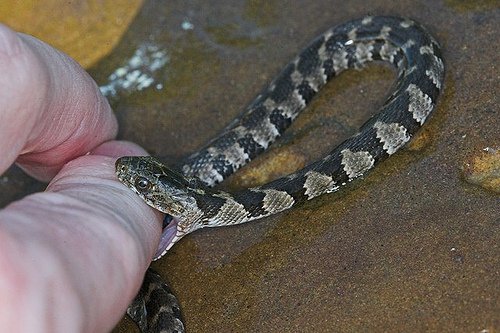
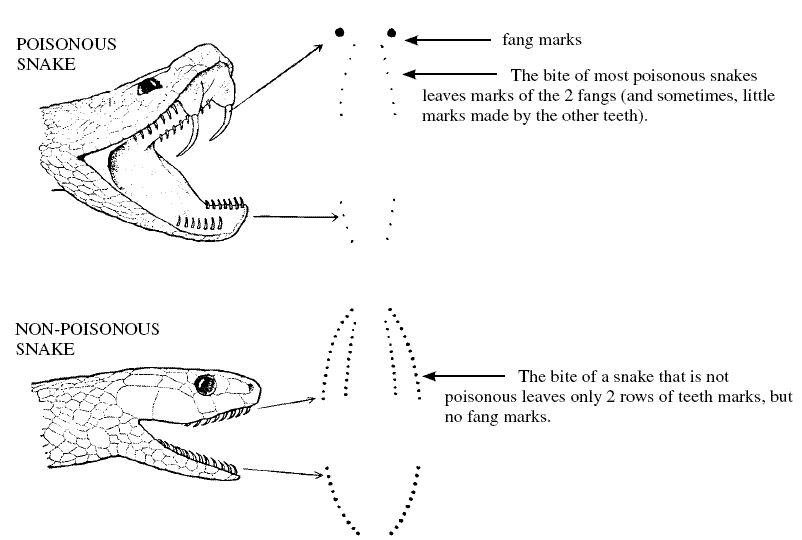
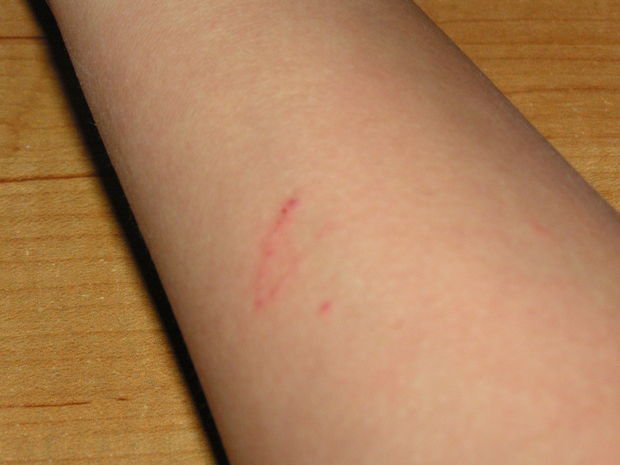

Its propably the same routine than with any other animal bite. People sometimes underestimate the risks, especially if it is from a pet, like a cat. Even their scratches can cause nasty infections. I guess, if there are after effects like reddening, pain, swelling, itching and so on, a doctors visit may be in order. Before things get really ugly.
Great post , very informative! Even though I live in a region where there are no snakes .
I actually love snakes and would love to play with a big python or an anaconda .. under supervision of course _
Great post! Thanks for the info. It is true that some venomous, adult snakes can selectively choose to give a "blank", or bite without venom?
Also, I work in an inpatient pharmacy in an area with lots of rattlesnakes and I think it's important for people to understand that even if they are bitten by a venemous snake there is excellent medicine that will help if they remain calm and are treated in a timely fashion. Our meds help with several common venemous species and I've seen them work wonders.
Yeah they can! I wrote in my last post about adult snakes being able to control the amount of venom the inject. Some will inflict what are called dry bites where no venom is injected. But a bite from a venomous snake should always be treated as an envenomation.
You are right though, with rattlesnakes, there isn't too much danger. While rattlers can be lethal, it requires a pretty long time, more than enough time to get to a hospital for treatment. In other parts of the world, there are snakes that can kill in moments or, even with treatment, are still lethal. However here in the US, if you are bitten by a snake, you should be okay as long as you seek out treatment quickly.
That's actually really cool, and a great evolutionary advantage for preserving such a precious resource. And, rest assured, if I ever found myself on the wrong side of a venomous snake I'd assume it was not a dry bite.
I've read about some of the nastier bites in the snake world, and it would be an understatement to call them impressive. The chemistry geek in me truly marvels at how effective their venoms are and how they evolved into different types depending on their prey. Cool stuff :)
I geek out about the venom too lol. Here is one of my (really) old posts where I talk about why some snakes have venom that is inexplicably strong. It's probably one of my favorites.
https://steemit.com/science/@herpetologyguy/why-do-some-snakes-have-inexplicably-potent-venom
That's an excellent post. I've heard Wuster talk about it before and I think he has a very strong argument. Naturally the venom is going to evolve to kill prey common to a habitat. And prey will evolve resistances. That's the arms race that has been going on since forever. But I think he makes another good point in saying that sometimes they need a venom that simply doesn't fail. Whether it's for protection or because of scarcity of food, having a one hit KO would be a tremendous advantage. And it makes sense the venom messes us up so badly because snakes have never been a predator to humans, so we've never needed to evolve to resist their venoms.
But, that said, with advances in gene encoding we might very well reach a point where humans are highly resistant or immune to these things... exciting, but mired in controversy. Interesting, nonetheless
I found this guy in my driveway a couple days ago! I don't touch them but they're great to admire
Congratulations @herpetologyguy! You have completed some achievement on Steemit and have been rewarded with new badge(s) :
Click on any badge to view your own Board of Honor on SteemitBoard.
For more information about SteemitBoard, click here
If you no longer want to receive notifications, reply to this comment with the word
STOPPersonally I have come in contact with several rattle snakes. I grew up in Arizona. You need to have a good fear of them if you are going to stay alive. That bite is no joke. (never been bit) Thanks for the cool post.
My next post will tackle dealing with venomous bites! You're right, no joke there!
I personally don't think people should fear them (I spend most of my time convincing people not to fear these animals) but for sure a healthy respect for them keeps us (and them) safe!
My brother-in-law is really into snakes. He has a lot of them but I can't remember what kind they are. He used to have indigo snakes but I think they all died. So we were visiting him once and we were out at a creek and he saw a snake near my son, so he picked it up. Then he pointed out to me that the snake just kept biting him near his finger nail. I was kind of freaked out and he had blood on his finger and all. He was as calm as could be, moved the snake to a safer place and just went on with life! He said it didn't hurt at all, just little pricks feeling. I thought he was crazy, so I'm glad to read on here that really is the case. Very interesting! Thanks for the post! I learned some stuff!!
While doing a snake fungal study I had one that bit me a couple times before I secured the head. I actually feel worse for the snake when they bite me! Sometimes their teeth get caught and can break or fall out so I try to keep them from biting me for their own good as much as mine!
Yikes! That is so crazy!
Excellent information! Thank you. I come across quite a few snakes in and around my yard in South Africa as our property is adjacent to farmland, but have never yet experienced any problems.
I have two phobias. Spiders and snakes. It's nice to know that snakes most often attack on the defensive, and that you can generally tell if the snake is venomous by the bite mark pattern. Good tips that will make me feel abouttt 5% better being anywhere near a snake. Thanks for the lesson.